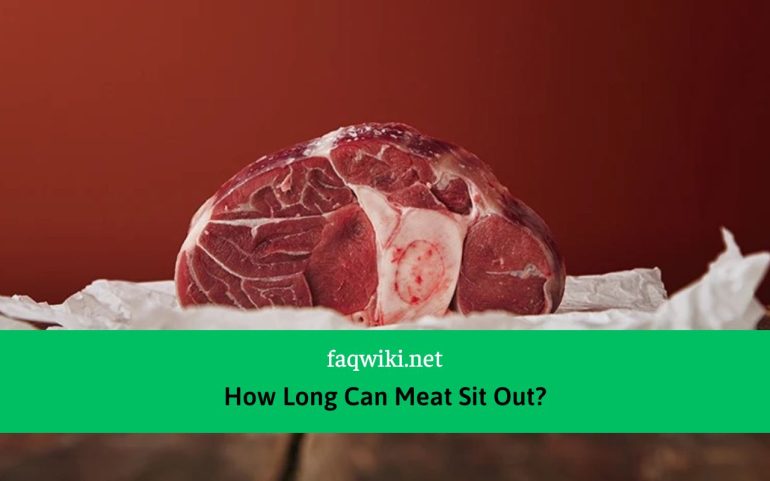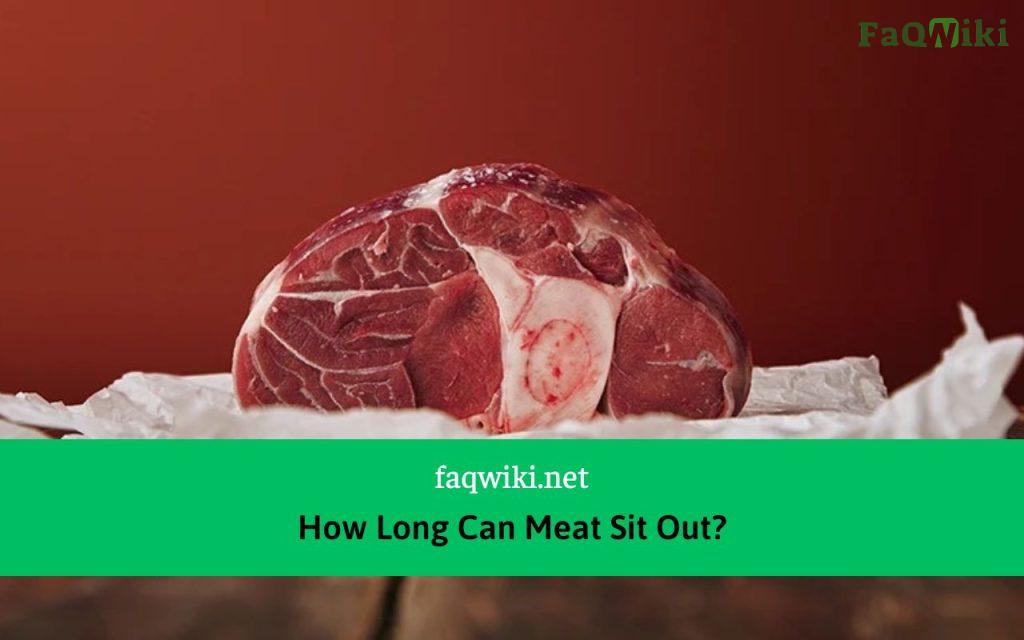How Long Can Meat Sit Out?

How Long Can Meat Sit Out? Food safety and handling practices are crucial for preventing foodborne illnesses. In particular, understanding how long meat can sit out before it becomes unsafe to eat is important. In this article, we will cover the factors that affect how long meat can sit out, guidelines for storing raw and cooked meat, special considerations for different types of meat, safe temperature zones for meat, best practices for storing meat, preventing cross-contamination, safe handling practices, and what to do if you suspect meat has been left out too long.

Understanding Foodborne Illnesses
Foodborne illnesses are caused by consuming contaminated food or beverages. Common bacteria and viruses that can cause foodborne illnesses include Salmonella, Listeria, E. coli, and Norovirus. Symptoms of foodborne illnesses may include nausea, vomiting, diarrhea, fever, and stomach cramps. In severe cases, foodborne illnesses can lead to hospitalization or even death. Preventing foodborne illnesses through proper food handling and storage is essential.
Factors that Affect How Long Meat Can Sit Out
The temperature and humidity are the two primary factors that affect how long meat can sit out. When meat is left out at room temperature, it provides the ideal environment for bacteria to grow, which can cause foodborne illnesses. The type of meat, storage conditions, and packaging and preparation methods also impact how long meat can sit out.
How Long Can Raw Meat Sit Out?
The general guideline for storing raw meat is to keep it refrigerated or frozen until it is ready to be cooked. Raw meat should not be left out at room temperature for more than two hours. This applies to all types of raw meat, including beef, chicken, pork, and seafood. If the temperature is above 90°F (32°C), raw meat should not be left out for more than one hour.
How Long Can Cooked Meat Sit Out?
Cooked meat should not be left out at room temperature for more than two hours. This applies to all types of cooked meat, including beef, chicken, pork, and seafood. If the temperature is above 90°F (32°C), cooked meat should not be left out for more than one hour. After two hours, bacteria can begin to grow, increasing the risk of foodborne illnesses.
Special Considerations for Different Types of Meat
Different types of meat have different storage requirements. Beef should be refrigerated or frozen and should not be left out at room temperature for more than two hours. Chicken should be refrigerated or frozen and should not be left out at room temperature for more than two hours. Pork should be refrigerated or frozen and should not be left out at room temperature for more than two hours. Seafood should be refrigerated or frozen and should not be left out at room temperature for more than two hours. Game meat should be refrigerated or frozen and should not be left out at room temperature for more than two hours.
Understanding Safe Temperature Zones for Meat
To ensure that meat is safe to eat, it must be cooked to the correct temperature. The safe temperature zones for meat are as follows: Beef (145°F or 63°C), Chicken (165°F or 74°C), Pork (145°F or 63°C), and Seafood (145°F or 63°C). It is essential to use a meat thermometer to ensure that meat is cooked to the correct temperature.
Best Practices for Storing Meat
When storing meat, it is essential to follow proper food handling and storage practices. Tips for safely storing meat in the refrigerator include keeping meat in its original packaging, placing it on the bottom shelf of the refrigerator, and ensuring that the temperature is set to 40°F (4°C) or below. Tips for safely storing meat in the freezer include wrapping meat tightly in freezer-safe packaging, labeling it with the date, and storing it at 0°F (-18°C) or below.
Preventing Cross-Contamination
Cross-contamination occurs when bacteria from one food item spread to another food item. To prevent cross-contamination, it is essential to store raw meat separately from ready-to-eat food items. When handling raw meat, use separate cutting boards, utensils, and dishes to prevent bacteria from spreading. Be sure to wash your hands thoroughly with soap and water before and after handling meat.
Safe Handling Practices
When handling meat, it is essential to follow safe handling practices to prevent the spread of bacteria. Always wash your hands thoroughly with soap and water before and after handling meat. Keep meat at the proper temperature and avoid touching your face, hair, or any other body part while handling meat. When marinating meat, be sure to keep it in the refrigerator and discard any leftover marinade that has come into contact with raw meat.
What to Do if You Suspect Meat Has Been Left Out Too Long?
If you suspect that meat has been left out too long, it is essential to err on the side of caution and throw it away. Bacteria can grow rapidly at room temperature, and consuming contaminated meat can cause foodborne illnesses. If you are unsure whether meat is safe to eat, use a meat thermometer to ensure that it has been cooked to the correct temperature.
Conclusion
Proper food safety and handling practices are crucial for preventing foodborne illnesses. When it comes to meat, it is important to understand how long it can sit out, the safe temperature zones for cooking, and best practices for storing, preventing cross-contamination, and safe handling practices. By following these guidelines, you can ensure that the meat you consume is safe and free from harmful bacteria.
FAQs
Q: Can you refrigerate meat after it has been left out?
A: If meat has been left out for more than two hours, it is not safe to eat, even if it is refrigerated afterwards. Bacteria can grow rapidly at room temperature, and refrigeration will not stop the growth of bacteria that has already occurred.
Q: Can you cook meat that has been left out overnight?
A: No, meat that has been left out overnight should be discarded. Bacteria can grow rapidly at room temperature, and consuming contaminated meat can cause foodborne illnesses.
Q: How long can cooked meat be stored in the refrigerator?
A: Cooked meat can be stored in the refrigerator for up to four days. After that, it should be discarded.
Q: How can I tell if meat is cooked to the correct temperature?
A: The only way to tell if meat is cooked to the correct temperature is to use a meat thermometer. The safe temperature zones for meat are as follows: Beef (145°F or 63°C), Chicken (165°F or 74°C), Pork (145°F or 63°C), and Seafood (145°F or 63°C).
